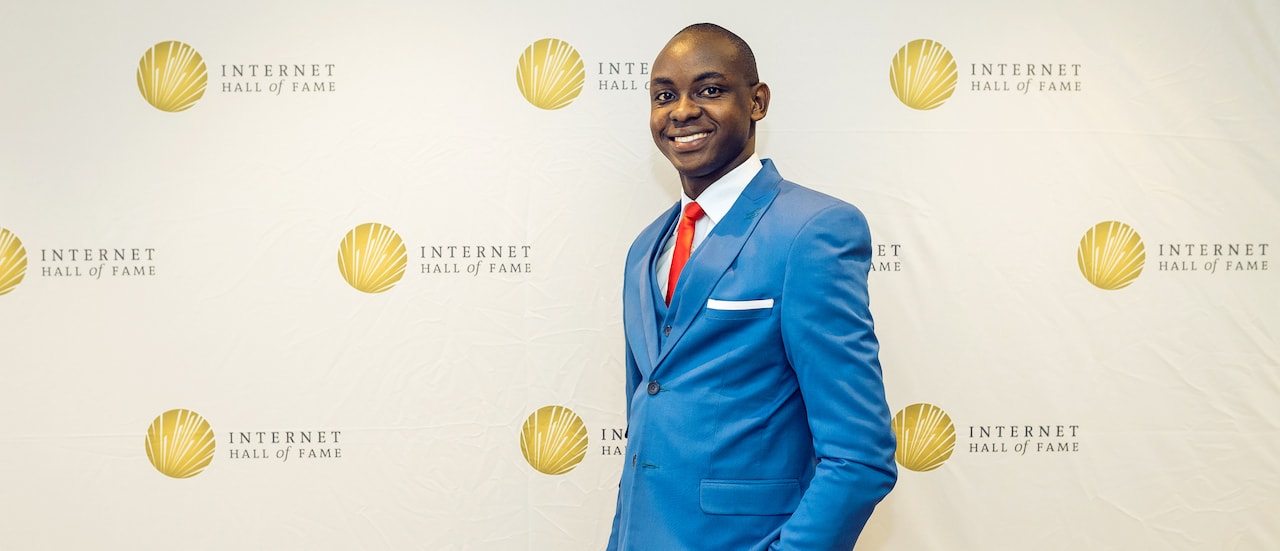Last year, the Internet Society unveiled the 2017 Global Internet Report: Paths to Our Digital Future. The interactive report identifies the drivers affecting tomorrow’s Internet and their impact on Media & Society, Digital Divides, and Personal Rights & Freedoms. In June 2018, we interviewed two stakeholders –Biddemu Bazil Mwotta, who introduced an agribusiness app, and Roxanne Varza, the director of a startup incubator – to hear their different perspectives on the forces shaping the Internet.
Biddemu Bazil Mwotta, a 25 under 25 awardee, introduced the mobile-agribusiness-app AgroDuuka, which connects farmers directly with buyers in Uganda, his home country. AgroDuuka creates a market for local farmers, where there was none before, and eliminates the cost of working through intermediaries. To date, it has connected more than 800 smallholder farmers from 36 villages to buyers throughout Uganda. (You can read Roxanne Varza’s interview here).
The Internet Society: The AgroDuuka app, which you developed, bridges traditional barriers for farmers who want to access new markets by connecting them directly with buyers. Why did you develop the app?
Biddemu Bazil Mwotta: I grew up in an agricultural community in rural Uganda. My mother is a farmer, and I always used to help her in her garden. I realized that my mother and many other farmers in community were being exploited by middle agents who were buying produce from them and selling the produce at exorbitant prices in urban areas. AgroDuuka thus empowers farmers like my mother with information – information like market prices in the region and broader.
For my mother, the Internet has had a significantly positive effect on her life. She can now sell her produce to the right buyers and the right price, and can make a profit – something she rarely did before. And most people in my community are very happy about this. My mother also has more time at hand – time which she would normally have used to travel to markets, she can now use to do other things.
What’s it like for startups like yours to compete in a tech landscape seemingly dominated by a few tech giants, like Google, Facebook, and Amazon?
It is difficult for startups to compete in the tech landscape due to limited funds for scaling up. On the other hand, big tech companies enjoy economies of scale, for instance.
What is hindering wider adoption of your app?
I really believe the Internet can influence development in Uganda and Africa more broadly – as apps like mine have shown. But in Uganda, very few people actually have access to the Internet. And it’s really hard to include them in the potential benefits if they don’t have actual access. A lack of infrastructure in Uganda is probably the biggest barrier to Internet access, especially in rural areas. But even in some urban areas like Kampala the quality and speed of the Internet is often limited. Without improving access levels, and the quality of access that is available, our people won’t be able to benefit from the Internet’s potential for development.
Where do you hope to be by 2022 – or what do you hope to have achieved? What are your hopes for your mother and other agricultural entrepreneurs using your app?
In 2022, I hope AgroDuuka will take lead in the offering of the fairer agricultural trade transactions in the world. We hope to have a global agricultural community. I hope that my mother and other farmers will not be dependent on the local market by 2022. Theirs, I hope, will be a global market in which they can sell to countries across Europe, America, and Asia, for instance. The whole world should be open to them.
What are your fears and hopes for the future of the Internet?
I am afraid that people will cause harm online and offline which will not only prevent the Internet from supporting development, but which could also risk humanity. But even more so, I’m afraid that the inequality gap will increase for people who don’t have access to the Internet. They will be left further behind.
I hope that everybody is able to access the Internet, as I believe the Internet will be at the centre of development for all communities in Uganda and beyond. The Internet can give us all equal opportunities – and can therefore promote equality in its own way.
What do you think the future of the Internet looks like? Explore the 2017 Global Internet Report: Paths to Our Digital Future to see how the Internet might transform our lives across the globe, then choose a path to help shape tomorrow.
